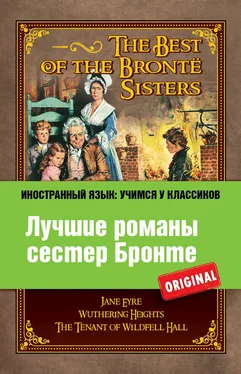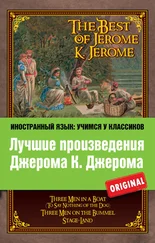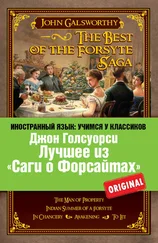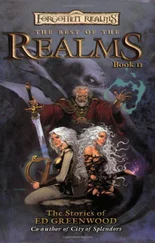‘Mr. Huntingdon,’ cried I, ‘I insist upon having that back! It is mine, and you have no right to take it. Give it me directly – I’ll never forgive you if you don’t!’
But the more vehemently I insisted, the more he aggravated my distress by his insulting, gleeful laugh. At length, however, he restored it to me, saying, – ‘Well, well, since you value it so much, I’ll not deprive you of it.’
To show him how I valued it, I tore it in two and threw it into the fire. He was not prepared for this. His merriment suddenly ceasing, he stared in mute amazement at the consuming treasure; and then, with a careless ‘Humph! I’ll go and shoot now,’ he turned on his heel and vacated the apartment by the window as he came, and setting on his hat with an air, took up his gun and walked away, whistling as he went – and leaving me not too much agitated to finish my picture, for I was glad, at the moment, that I had vexed him.
When I returned to the drawing-room, I found Mr. Boarham had ventured to follow his comrades to the field; and shortly after lunch, to which they did not think of returning, I volunteered to accompany the ladies in a walk, and show Annabella and Milicent the beauties of the country. We took a long ramble, and re-entered the park just as the sportsmen were returning from their expedition. Toil-spent and travel-stained, the main body of them crossed over the grass to avoid us, but Mr. Huntingdon, all spattered and splashed as he was, and stained with the blood of his prey – to the no small offence of my aunt’s strict sense of propriety – came out of his way to meet us, with cheerful smiles and words for all but me, and placing himself between Annabella Wilmot and myself, walked up the road and began to relate the various exploits and disasters of the day, in a manner that would have convulsed me with laughter if I had been on good terms with him; but he addressed himself entirely to Annabella, and I, of course, left all the laughter and all the badinage to her, and affecting the utmost indifference to whatever passed between them, walked along a few paces apart, and looking every way but theirs, while my aunt and Milicent went before, linked arm in arm and gravely discoursing together. At length Mr. Huntingdon turned to me, and addressing me in a confidential whisper, said, – ‘Helen, why did you burn my picture?’
‘Because I wished to destroy it,’ I answered, with an asperity it is useless now to lament.
‘Oh, very good!’ was the reply; ‘if you don’t value me, I must turn to somebody that will.’
I thought it was partly in jest – a half-playful mixture of mock resignation and pretended indifference: but immediately he resumed his place beside Miss Wilmot, and from that hour to this – during all that evening, and all the next day, and the next, and the next, and all this morning (the 22nd), he has never given me one kind word or one pleasant look – never spoken to me, but from pure necessity – never glanced towards me but with a cold, unfriendly look I thought him quite incapable of assuming.
My aunt observes the change, and though she has not inquired the cause or made any remark to me on the subject, I see it gives her pleasure. Miss Wilmot observes it, too, and triumphantly ascribes it to her own superior charms and blandishments; but I am truly miserable – more so than I like to acknowledge to myself. Pride refuses to aid me. It has brought me into the scrape, and will not help me out of it.
He meant no harm – it was only his joyous, playful spirit; and I, by my acrimonious resentment – so serious, so disproportioned to the offence – have so wounded his feelings, so deeply offended him, that I fear he will never forgive me – and all for a mere jest! He thinks I dislike him, and he must continue to think so. I must lose him for ever, and Annabella may win him, and triumph as she will.
But it is not my loss nor her triumph that I deplore so greatly as the wreck of my fond hopes for his advantage, and her unworthiness of his affection, and the injury he will do himself by trusting his happiness to her. She does not love him: she thinks only of herself. She cannot appreciate the good that is in him: she will neither see it, nor value it, nor cherish it. She will neither deplore his faults nor attempt their amendment, but rather aggravate them by her own. And I doubt whether she will not deceive him after all. I see she is playing double between him and Lord Lowborough, and while she amuses herself with the lively Huntingdon, she tries her utmost to enslave his moody friend; and should she succeed in bringing both to her feet, the fascinating commoner will have but little chance against the lordly peer. If he observes her artful by-play, it gives him no uneasiness, but rather adds new zest to his diversion by opposing a stimulating check to his otherwise too easy conquest.
Messrs. Wilmot and Boarham have severally taken occasion by his neglect of me to renew their advances; and if I were like Annabella and some others I should take advantage of their perseverance to endeavour to pique him into a revival of affection; but, justice and honesty apart, I could not bear to do it. I am annoyed enough by their present persecutions without encouraging them further; and even if I did it would have precious little effect upon him. He sees me suffering under the condescending attentions and prosaic discourses of the one, and the repulsive obtrusions of the other, without so much as a shadow of commiseration for me, or resentment against my tormentors. He never could have loved me, or he would not have resigned me so willingly, and he would not go on talking to everybody else so cheerfully as he does – laughing and jesting with Lord Lowborough and my uncle, teasing Milicent Hargrave, and flirting with Annabella Wilmot – as if nothing were on his mind. Oh! why can’t I hate him? I must be infatuated, or I should scorn to regret him as I do. But I must rally all the powers I have remaining, and try to tear him from my heart. There goes the dinner-bell, and here comes my aunt to scold me for sitting here at my desk all day, instead of staying with the company: wish the company were – gone.
Twenty Second: Night. – What have I done? and what will be the end of it? I cannot calmly reflect upon it; I cannot sleep. I must have recourse to my diary again; I will commit it to paper to-night, and see what I shall think of it to-morrow.
I went down to dinner resolving to be cheerful and well-conducted, and kept my resolution very creditably, considering how my head ached and how internally wretched I felt. I don’t know what is come over me of late; my very energies, both mental and physical, must be strangely impaired, or I should not have acted so weakly in many respects as I have done; but I have not been well this last day or two. I suppose it is with sleeping and eating so little, and thinking so much, and being so continually out of humour. But to return. I was exerting myself to sing and play for the amusement, and at the request, of my aunt and Milicent, before the gentlemen came into the drawing-room (Miss Wilmot never likes to waste her musical efforts on ladies’ ears alone). Milicent had asked for a little Scotch song, and I was just in the middle of it when they entered. The first thing Mr. Huntingdon did was to walk up to Annabella.
‘Now, Miss Wilmot, won’t you give us some music to-night?’ said he. ‘Do now! I know you will, when I tell you that I have been hungering and thirsting all day for the sound of your voice. Come! the piano’s vacant.’
It was, for I had quitted it immediately upon hearing his petition. Had I been endowed with a proper degree of self-possession, I should have turned to the lady myself, and cheerfully joined my entreaties to his, whereby I should have disappointed his expectations, if the affront had been purposely given, or made him sensible of the wrong, if it had only arisen from thoughtlessness; but I felt it too deeply to do anything but rise from the music-stool, and throw myself back on the sofa, suppressing with difficulty the audible expression of the bitterness I felt within. I knew Annabella’s musical talents were superior to mine, but that was no reason why I should be treated as a perfect nonentity. The time and the manner of his asking her appeared like a gratuitous insult to me; and I could have wept with pure vexation.
Читать дальше
Конец ознакомительного отрывка
Купить книгу












